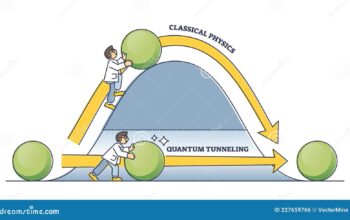Quantum mechanics, a fundamental theory in physics, is replete with enigmas and complexities that challenge our understanding of the universe at the microscopic level. Imagine for a moment: if you could perceive the world through the lens of quantum mechanics, how differently would you approach the mundane aspects of life? This not only posits a playful question but also heralds a formidable challenge. The challenge is twofold: the cognitive leap required to grasp its concepts and the philosophical implications that often accompany its principles.
The study of quantum mechanics is akin to embarking on a journey through an abstract labyrinth where classical intuitions about reality frequently dissolve. At its core, quantum mechanics delves into the behavior of particles at atomic and subatomic scales, as elementary as electrons and as complex as atoms. Herein lies the allure: the principles governing these realms upend centuries of established notions in physics. For students and enthusiasts, this opens the door to a thrilling intellectual adventure marked by paradoxes and counterintuitive phenomena.
One of the noteworthy features of quantum mechanics is its inherent probabilistic nature. Unlike classical mechanics, which relies on deterministic laws to predict outcomes, quantum mechanics embraces uncertainty. The famous wave-particle duality epitomizes this notion; particles exhibit properties of both waves and particles depending on the experimental conditions. Want to know how bizarre this can get? Imagine that a particle can exist in multiple states simultaneously until observed—a concept known as superposition. Explaining this phenomenon requires a departure from conventional thinking, demanding a readiness to accept that reality may not adhere to simplistic interpretations.
Furthermore, quantum entanglement introduces another layer of fascination. When particles become entangled, the state of one instantly influences the state of another, regardless of the distance separating them. This remarkable property defies classical communication boundaries and presents profound implications for future technologies such as quantum computing and secure communication channels. The question then arises: what does this interconnectedness imply about the very fabric of reality? With every inquiry into entanglement, one finds themselves drawn deeper into the mysteries of quantum phenomena.
Moreover, the mathematics underlying quantum mechanics is a treasure trove of intellectual challenge. The principles are often illustrated through complex equations and abstract algebras. Mastery of linear algebra, for instance, becomes paramount in understanding quantum states represented in Hilbert space. The Schrödinger equation—often hailed as the cornerstone of quantum theory—requires not only mathematical prowess but also an ability to conceptualize the behavior of particles within potential landscapes. Engaging with these advanced mathematical tools can initially seem daunting; yet, therein lies an opportunity to cultivate critical thinking and analytical skills.
In the pedagogical arena, educators face the task of conveying these advanced ideas in a digestible manner. Innovative teaching strategies have burgeoned, from simulations to interactive tutorials, that help elucidate complex concepts while maintaining engagement. This educational evolution highlights the intrinsic value that quantum mechanics holds—not merely as a subject to be studied but as a gateway to fostering a deeper appreciation for the scientific method itself. Peer discussions and collaborative learning environments can enhance one’s grasp of quantum phenomena, thereby transforming individual study into a communal intellectual pursuit.
Yet, detractors may pose the question: why bother with such an elusive field of study? The answer lies in quantum mechanics’ rich implications across a multitude of domains. Fields such as quantum computing, medicine, and materials science are steadily being revolutionized by principles derived from quantum theories. For instance, quantum optics explores the interactions between light and matter, ushering in advancements in imaging technologies. Within the medical realm, quantum mechanics contributes to innovations in MRI technology, enhancing diagnostic capabilities. The interdisciplinary applications alone warrant a serious engagement with this field.
In essence, the journey through quantum mechanics is not merely an academic exercise; it is an invitation to reevaluate our place in the cosmos. Each tantalizing principle beckons learners to ponder profound questions about reality, existence, and the limits of human understanding. Is the universe inherently deterministic, or does it gently nudge us toward a realm of inherent unpredictability? As learners grapple with these philosophical dilemmas, quantum mechanics transcends the traditional boundaries of physics, intertwining with metaphysical inquiry.
To those embarking on this expedition, it is imperative to remember that the allure of quantum mechanics lies not solely in its answers but in the myriad of questions it evokes. This journey is replete with pedagogical challenges and intellectual rewards. As one immerses themselves in this captivating realm, they will uncover not just the mechanics of particles and waves but also the essence of curiosity that propels humanity toward deeper understanding. Thus, one must ask: Are you prepared to embrace the fascinating paradoxes of quantum mechanics and the myriad possibilities they present?
The challenge awaits; the excitement beckons. If you dare to delve into quantum mechanics, prepare to unravel the mysteries that not only define our universe but also our very existence within it.












